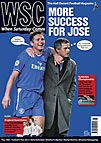 Are self-deprecation and sexual repression at the heart of English football? Harry Pearson thinks it may be so
Are self-deprecation and sexual repression at the heart of English football? Harry Pearson thinks it may be so
The English are routinely disparaging about English football. Part of it is frustration at years of failure, but mainly it is a way of distancing ourselves from other English people. Our ancestors long ago perfected the art of self-deprecation once removed. When the English speak of the English they are not speaking of themselves but of, you know, those other “typical” English people. Thus when an English person says that “the English are sexually repressed”, what they are actually telling you is: “I am not sexually repressed.”
In his follow-up to the brilliant Brilliant Orange, David Winner has fun with English self-deprecation and sexual repression. He argues, perhaps not entirely seriously, that because the Victorian public schools that gave birth to the organised game saw physical exercise as a means to divert energy away from sex, English football came to be all about the expenditure of muscular energy rather than the application of skill. Thus was born our high stamina, physical game that is rich in courage, low on technique.
The problem with this notion is that while English fans may place high value on commitment, they don’t undervalue skill at all: the two most talked-about League players of all time are Stanley Matthews and George Best. And Middlesbrough fans in a survey (cited later by Winner) elected as the club’s two greatest players of all time Juninho and Wilf Mannion, when they should – by his reckoning – have opted for, say, Tony Mowbray and Stuart Boam.
As he showed in Brilliant Orange, Winner is a witty and intelligent writer with a gift for weaving apparently incongruous strands into a persuasive theory. The trouble here is that much of what he says seems either provocatively contentious or plain wrong. He states, for instance, that the English are the only fans in the world who nurture the past in an obsessive way and fixate on their teams’ traditions. But if that is the case, why does the museum at the Camp Nou draw hundreds of thousands of visitors each year? In Germany, does the animosity many non-Bayern Munich fans feel toward FC Hollywood re-emerge afresh with each generation? And what are we to make of the Old Firm?
The latter highlights Winner’s big problem. English football is not and never has been truly or exclusively English. Rather it is British and more, profoundly influenced by the involvement – from Victorian times – of the Scots, Welsh and Irish. For a book such as Those Feet this is a serious obstacle. Because while it is all very well for the liberal Englishman to make fun of the English, he is generally not so comfortable these days about making fun of our Celtic neighbours. Winner sidesteps this problem by simply and, well, Englishly pretending whenever it suits him that England, Great Britain and neighbouring islands are one and the same thing. Thus we get a whole chapter inspired by Roy Keane who, according to the author, is “a timeless archetype of the English game”, despite being resolutely and distinctly Irish. Likewise, in a chapter on how the English are the only fans who hoard memorabilia, Winner quotes a Glaswegian with a shrine to Celtic in a corner of his living room.
Perhaps then this Englishness of which the author writes is a trait that is not just confined to England, but a characteristic that is shared by many non-English people around the world? It seems possible when we look at Manchester United. Winner asserts that United has built an image around the tragedy of Munich in a way that is unimaginable in other countries. Yet Manchester United are the world’s most popular team, so presumably fans of the club from Thailand, Denmark or wherever are also buying into Old Trafford’s heritage, are eager to be part of what the author identifies as “a semi-religious cult”, desperate to express the English side of their personalities by applauding the English side of Roy Keane’s.
Those Feet – a sensual history of English football. David Winner, Bloomsbury £14.99
From WSC 219 May 2005. What was happening this month